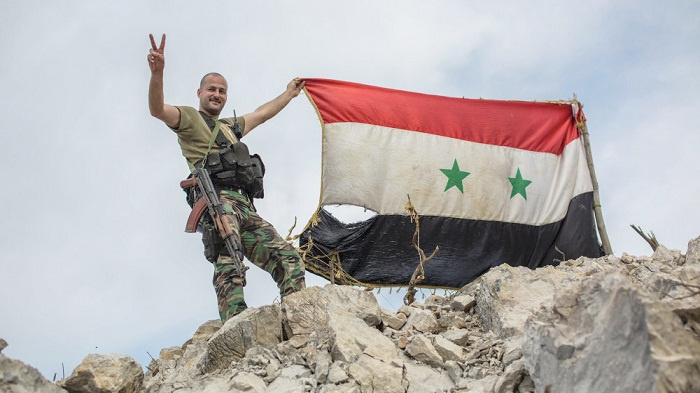Situation Report: Latest developments in Syria

Over the past three decades, Syria has played a significant role as a logistic corridor for the ‘Axis of Resistance’. Besides its significant geopolitical status, Syria hosts energy transit routes.
The Syrian crisis had both domestic and foreign causes. On the domestic side, a pile-up of public demands and unfair treatment of protests by sectors inside the Syrian government resulted in the eruption of a crisis. A population boom in Syria, particularly in rural areas, turned into a fertile ground for the spread of radical ideologies in these regions. The traditional struggle between the Syrian establishment and Muslim Brotherhood also turned into abreaction and deepened the crisis.
The Syrian unrest was initially influenced by the chain of revolutions in Tunisia, Libya, and Egypt, the so-called “Arab Spring”. What matters however, is that international players, and in particular the United States, did not see the Syrian government as fit to continue its rule over the country. International players such as the US, Israel, and Saudi Arabia tried to replicate Arab Spring developments in Syria. Certain media, such as Al-Arabiya, also helped the emergence, continuation, and the deepening of the crisis by shaping the public opinion.
Developments in Syria have taken different forms over the last five years, but the current situation is of great significance. For different reasons, the current crisis is remarkably complicated in comparison with other instances. At the moment, a combination of domestic demands and foreign interests are key factors that shape the Syrian crisis, though the former is overshadowed by the latter, rendering public demands somehow a second priority. Regime change is not considered the most important demand at the moment, and is replaced with the necessity of restoring security in Syria.
Moreover, the prospects of field developments are obscure. All the key players in Syria have reached a consensus that the military solution could not end the crisis and a political solution should be pursued.
The Aleppo Province shares a border with Turkey and is a major channel used to reinforce terrorist groups from the north. Its eastern part fell to opposition control in 2012, providing an advantage for them to use it as a corridor for weapon transfer. After the fall of eastern Aleppo, nearly 60 percent of the city came under opposition control. As Syria’s economic capital, Aleppo had a high chance to serve as the capital of opposition groups and as long as the city was in their control, they could use it as a trump card in negotiations. Aleppo is also the most populated province in Syria and could help armed or terrorist group a great deal in terms of recruitment. Moreover, the majority of armed groups in Aleppo were those designated as ‘moderate’ by Washington. The West, Turkey, and their supporters regarded Aleppo an important front.
What put the liberation of Aleppo as a serious priority on the agenda was the fall of Idlib, which had turned into a grave threat to Aleppo. Thus, Syrian government’s field strategists decided to stymie complete fall of the city with whatever it would take. A second reason was increased pressure against Idlib and its citizens by the terrorists.
Other important factors included the prolongation of the crisis, frustration and emergence of infighting among armed groups, subordination on the part of some opposition groups to Turkey and other foreign forces, and a shift in Turkey’s priorities, so much so that many of the groups now accuse Ankara as failing to back them as it did before.
The domestic situation in the US, confusion and differences within the US administration regarding Syria, also influenced liberation of Aleppo. This tipped the balance between the armed opposition and the Syrian government in favor of the latter, while imposing psychological pressure on the former.
Some observers argue we will witness a domino of fall of regions under the occupation of terrorists. Idlib is named as the next candidate for liberation after the recent developments in Aleppo.
One political result of Aleppo’s liberation is the return to the table by the opposition who has lost its trump card. It most probably has also caused a shift in the position of European countries, forced to give up their black and white policy and engage in talks with regional players.
It is likely that we see increased field developments by Saudi Arabia, the UAE, or Qatar; however, Turkey has adopted a policy of tolerance with and management of the consequences of the liberation. Turkey’s priorities have also changed in practice, compared with the past.
Donald Trump’s presidency, his administration, and his positions have made some inside and outside of Syria optimistic about alleviation of the Syrian crisis because they find it likely that Washington becomes more moderate regarding Syria. Of course, it is yet to be seen what approach Trump and the GOP will adopt. Trump’s call for safe zones in Syria should be taken into serious consideration.
Iran, an active and influential player in regional developments, is known as a stable factor and a powerful ally. Hezbollah’s engagement and its measures as a reliable regional player whose positions are based on ration and reason have also convinced public opinions of its [constructive] role in region. Instead of fighting terrorism inside the country, we have gone beyond our borders to take action against terrorists, and warded off their danger, which is a significant achievement.
* This is an abridged translation of Mohammadreza Raouf Sheibani's recent speech in Strategic Council for Foreign Relations, an advisory body whose members are appointed by Iran's Supreme Leader Ayatollah Ali Khamenei.

